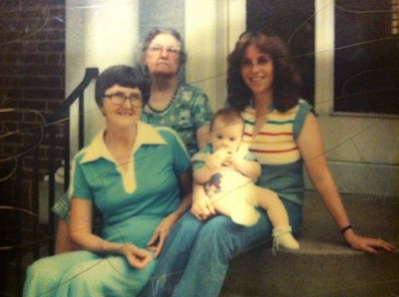Two Grandmas and A Mother
Addie, Honey, and me holding Alex
My grandmother Teresa was born in Italy and immigrated to the United States in the early 1900s. She didn’t have much time to enjoy her new adopted country because she passed away a year or so after giving birth to my dad in New Jersey. It was tuberculosis that took her life. I have no idea how old she was when she died, and I have only one grainy photo of her. I have been told I resemble her though, and that is a nice thought. I wish I had met her (and my grandfather Carmine too) but since I did not, I can only imagine what their lives were like in a place where they did not speak the language and at times were not treated with the respect they deserved. Immigration never has been easy.
My grandmother Addie was born in Kentucky, the bluegrass state, and lived there her entire life. She seldom traveled and if so, it was not far from home. That suited her just fine and I must say I take after her. I am a homebody at heart, too.
Addie never wore a bra. She did not own a girdle either as many women in the early and mid-1900s did. She scoffed at the damned things determined to be unconsticted by such contraptions. Instead, her undergarments were loose one-piece affairs that she stepped into, sliding the upper straps over her shoulders. And that was that! Her anatomy adapted as only one’s body will, and that worked for her. Still, she took pride in looking nice, wearing lovely dresses, hats, and gloves – garment mainstays throughout the forties, fifties, and sixties in the South.
Sadly, Addie lost her first child to hydrocephalus, a condition that way back then had few treatment options. The baby was named Paul, and in all the years I knew my grandmother, Addie, she never ceased to mention him from time to time. The love and grief were that deep.
Addie had a canary named Peachy. She treasured that little bird that blessed her life with song. She loved to garden (as do I) and was happy simply digging in the dirt. She never had a great deal of money, and with an unambitious husband, was left to fend for herself financially. She was a seamstress and had a large home with room enough to take in boarders. Random folks stayed and paid, and she fed them until it was time for them to move on.
I cannot remember Addie’s hair not being gray. It was long, thick, and she wore it in a conservative bun . . . that was until I came along. Addie loved to have her hair combed and brushed out and who better to do it than her little curly, red-haired granddaughter. She allowed me to pull and comb for too many minutes to count, letting me tie her strands into pigtails or ponytails that I adorned with artificial flowers and bows. I can almost imagine standing behind her right now with a comb in my hand, she tolerant and kind to a little girl who wanted to show her love. It’s a sweet memory.
Addie was devout, a churchgoer and a believer. When she lived with our family for a short time when she was older, I remember hearing her say her prayers at the breakfast table before drinking her coffee and munching on toast spread with apple butter. “Thank you, God, for another day.” I heard those words over and over and feel blessed to have heard them. And I won’t lie. I’ve been known to repeat the same sentence, even to this day.
Though her Christianity was solid to her core, Addie was a woman to be reckoned with if a game of cards were played. Rook was her favorite and she played with a passion though she’d happily take on an opponent in Rummy or Canasta too. She also loved croquet and was a shark if there ever was one. She could beat pretty much any player who challenged her as she knocked wooden balls through wickets across the lawn. I have a photograph of Addie playing croquet. She is bent over, mallet in hand with a facial expression of grit and determination. Winning was important; besides it was fun.
When I was a little girl we moved to England for a few years. When the movers came I was terrified that they would snatch up my doll and take her away. Addie saved the day. She, my dolly, and I sat on a rock in the far corner of the lawn and watched carefully until the moving truck was gone. The coast was clear. Addie, the protector, saved the day. Even today, if something goes wrong, I think about my grandmother and wonder, “What would Addie say? What would she do?” She’s still wired in somehow, and likely would appreciate knowing that. Maybe she does.
Oh, and by the way, my brother and I always called Addie by her first name – not grandma or grandmother or nana – just Addie. I believe my brother, Jay, was the culprit who labeled her Addie, and I followed suit. We never missed a beat and I know she liked it that way.
Addie had two children besides baby Paul as she called him – my mother, Nola Jean and my uncle, Alton, in that order. Both are gone now, but remembered with love, especially, my mom.
My mother’s life was challenging at times, but my brother and I could not have had a more loving, caring, doting mother. She taught us to appreciate the beauty in nature – the trees, the clouds, the falling leaves, and the flowers. “Just look at that little face,” she’d say, peering down at a tiny pansy that she imagined was smiling back at her. She loved daffodils, marigolds, roses, and clematis; she admired maples and willows, the sun, and the snow. She fancied lady bugs – so sweet and adorable. She pampered our pets, particularly our German Shepherd, Star, and her overly fluffy kitty named Patty. Mother had a heart so big, so warm, so full of love that our house became a place for friends to hang out, sometimes to see my brother and me, sometimes simply to chat with Mother. My friends called her Mama Jean. She embraced the title and would puff up when she heard her nickname. (Later in life, when her grandchildren named her Honey, she was equally as pleased. The name Honey stuck until the day she died.)
My mother, and my dad too, though not college-educated were avid readers who valued education and made sure we did too. Both Jay and I were good students (usually) who eventually graduated each from a different university and had good careers – he an architect, and me, a teacher. Our parents were proud, particularly our mother.
Nola Jean had pluck! Though she was pious at times, and hell bent on doing what was right, she could surprise us. She adored her grandchildren – two on the west coast and three on the east coast, but it was the west coast duo (my children) that provided the setting for a most memorable moment. On a visit to California, the children and Honey were discussing the use of the “F” word. She had heard it once too often, it seems, and deemed it absolutely inappropriate. However, even with that, she surprised us. One day the family was ready to watch a movie, but Honey had made a pie that was still in the oven.
“Hurry, Honey, the movie is starting,” one of the boys called.
“Just a second, boys. I just have to get this fucking pie out before it burns!”
The reaction was hilarious! The laughter at my mother’s comment lasted for some time . . . and her point was made. I will never forget it.
When Nola Jean Baird DeChesere passed away in 2010, I was heartbroken. Not a day passes by that I don’t think of her and remember her kindness, her goodness, her resilience, her spunk. As with my grandmother, Addie, if ever I am floundering within the context of life itself, I think of my mother. “What would Honey say about this? What would she advise me to do?” And, if I don’t resist, an answer usually comes to me, as if we had just finished one of our heart-to-hearts so many years ago. Ah, how I wish I could have one today.
With Mother’s Day coming soon, I felt compelled to write a bit about my grandmothers and my beloved mother. I have tried to be a decent mother myself, even having a few former students call me Mom a time or two. That always led to a chuckle. In the end, to my way of thinking, motherhood is a gift, a challenge, and at times has caused deep sorrow. I know other women can relate. And to all of them, Happy Mother’s Day. Enjoy your day.
www.jdechesere-boyle.com



